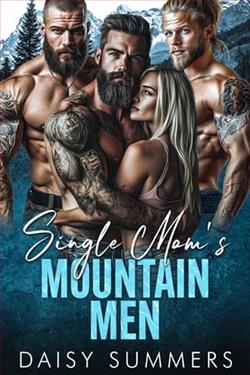Page 19 of Wild Child
I laughed.
“Worst time of day to fish anyway,” he said. “Except, it’s—”
“It’s not about the fish,” I replied, echoing his usual line so quickly it startled both of us. For a brief tangle, our eyes met, then skated away. I reached for my water bottle just to have something to do and took a sip.
“Yeah,” he agreed quietly. “It never was.”
Silence fell between us. Seconds stretched into minutes. My lips were tied. I had no idea what to say or where to start.
His voice broke the stillness like a firework again.
“I meant it when I said I didn’t want to go.”
He leaned back a little, looking perfectly at ease. As if we weren’t about to hash into our dark history. As if the secrets that had been smoldering in the background for years weren’t about to be thrown wide open. Like me, sunglasses hid his eyes. It seemed to make everything less intense.
“But you went.”
“Yeah.” He nodded. “And damn, if I haven’t regretted it every day.”
There was nothing to say, so I waited. A few moments later, he continued. “Dad’s back surgery set my parents back financially quite a bit. Do you remember that?”
I nodded, awash with vague memories of hospitals. Millie’s exhausted, fearful expression. Devin’s father had been in the hospital and then rehab for what felt like months. He’d regained his ability to walk, but the pain still plagued him for years. Even now, after recent physical therapy, he still had to take it easy.
“That sort of hospital stay, the rehab?” He tsked under his breath. “Just about wiped them out. We didn’t have health insurance at the time and had to take out a second mortgage to cover the bills. Mom applied for charities, tried to find ways to fundraise, you name it. Credit cards maxed out, that kind of thing.”
He let out a soft breath, a half-chuckle, as he shook his head. He tugged on his line as he admitted, “Maverick paid for my senior football season.”
I reared back. “What?”
He nodded and looked right at me. “Yeah. I was too embarrassed to tell anyone that we couldn’t afford all the gear, new cleats, that kind of stuff. Maverick offered after I told the coach I couldn’t play. Mav found out somehow.” He shrugged. “Don’t know how. He paid for everything.”
“I didn’t know that.”
Devin lifted his shoulders. “He promised he wouldn’t say. All the times I ate at your house? I did it because we didn’t have the money for a lot of food. Maverick and Bethany were always so generous. I was a teenager and a football player. Mom couldn’t keep up with my appetite. We were on food stamps. Bethany even paid for my tux for prom in exchange for free haircuts from Mom. She lied to my Mom and said it cost half of what it did.”
“Is that why you always ate at the coffee shop while we worked?” I asked, recalling days when he’d wolf down three sandwiches, five drinks, and a few scones. He’d forfeit his pay for the day.
He nodded.
My gut clenched. Money had always been tight at the Blaine household, but I hadn’t realized just how much. After his dad broke his back, they lived off what Millie could make as a hairstylist, which couldn’t have been much. Now that I looked back, it seemed like an obvious problem. Only a teenager would miss something like that.
Devin kept going, jaw tight as he gazed over the lake.
“So I practically lived with and ate with your family, which relieved some of the cost of food. Most of my clothes were thrift store finds out of Jackson City. I guess Mom would stay there for hours looking for stuff that seemed new so that I wasn’t embarrassed. I wouldn’t have cared, but she didn’t want me to be ashamed. She tried so hard, but there was no making that kind of money back.”
He leaned forward. He was more lost in the story than here on the canoe, now.
“When we started making those plans the summer before I graduated, I really meant to follow through.” He frowned. “Going to the state university with you? Sounded like a dream. Saving up money and then going to college with you would have been awesome. I didn’t . . . I didn’t want you to go alone. It didn’t seem safe or . . .” He paused, shook his head, and kept going. “As time went on, however, I started to do the math. The jobs I could get as an eighteen-year-old were mostly minimum wage. Even working two jobs and saving everything I could meant that I’d barely save enough for the first semester. But I couldn’t work like thatandgo to school once it started.”
Devin had always been gifted with learning. While I struggled with math and hated to read because it bored me, he sailed through his classes. Quarterback. Straight A student. Well-liked everywhere. College scholarships seemed inevitable.
But they hadn’t been.
“Then I lost the big scholarship I applied for, and I still don’t know why,” he said as if he’d just read my mind. “Jobs were hard to secure. I saw the writing on the wall.”
He let out a long breath and finally looked back at me. His fishing pole lay on the side of the canoe. Nothing would nibble now, and we’d both known it. But it felt better to act like we still participated in one of the things we both loved.
“Then my parents’ debts were called. They had to put a $7,000 payment down or lose the house and be forced to file for bankruptcy.” He held out his hands in a helpless gesture. “We have no family to fall back on. My parents would have been homeless or a charity case.”















